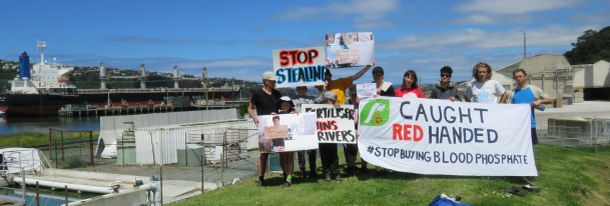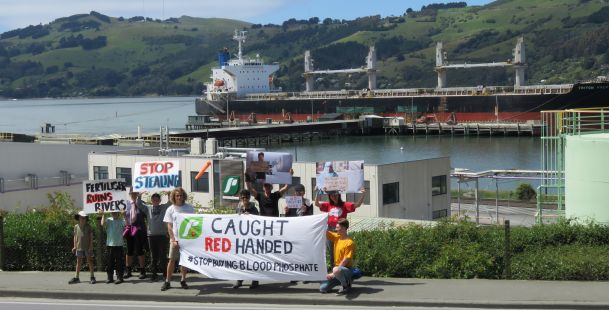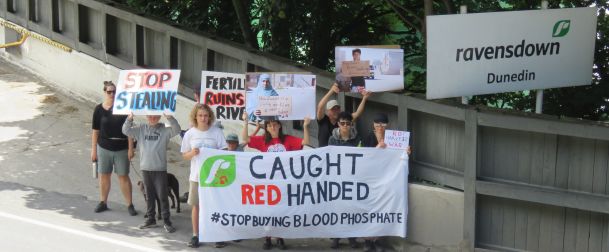
From the end of this year, 2 of 3 global importers of Western Sahara's controversial conflict minerals are from New Zealand. This week, locals protested in the city of Dunedin.
A local environmental organisation in Dunedin, New Zealand, this weekend protested the arrival of a bulk vessel entering the port, loaded with phosphate rock from occupied Western Sahara.
In the background of the photos, one can spot the vessel 'Triton Valk', just having arrived the port. The importer of the cargo is the fertilizer company Ravensdown.
“The occupation is pretty brutal” said Rose Murphy, spokesperson for Environmental Justice Ōtepoti, who were behind the protest , “I think the people of Dunedin would be horrified to know that a local business is funding such an injustice", she said.
Ms. Murphy stated that their group supports the right to self determination of the Saharawi people. "Ravensdown and Ballance should stop dealing in Blood Phosphate until they get a referendum for their independence", she said.
Last year a ship carrying phosphates destined for New Zealand was detained in South Africa as their courts ruled that the cargo was stolen from the people of Western Sahara.
The people of Western Sahara are calling for Ravensdown LTD and Ballance Agri-Nutrients to “stop stealing their future”. The two New Zealand fertilizer cooperatives are the last two companies that still import from the occupied territory apart from one Indian company partially owned by the Moroccan royal family.
All other previous importers globally have stopped purchasing from the controversial mine. The trade of the mineral from 2017 is reported in the WSRW report P for Plunder 2017, published in April 2018.
The Saharawi government has asked Ravensdown compensation for the goods, which the fertilizer cooperative had purchased from Morocco, the occupier.
The group owner of Triton Valk is Sumitomo Corp from Japan, while ship manager and operator is Triton Navigation BV from Amsterdam, the Netherlands.


TAQA-Moeve obtains land in occupied Western Sahara
Morocco’s push for green hydrogen has taken a decisive step forward - on territory it does not legally own.
EU-Morocco Statement: autonomy without self-determination, law without lawfulness
A joint statement that came out of last week’s EU-Morocco Association Council asks readers to believe in a fiction: that an undefined autonomy plan imposed by an occupying power can satisfy the right to self-determination, and that respect for international law can coexist with the systematic ignoring of the EU’s own highest court.
Greenland Yes, Western Sahara No? The EU’s self-determination test
As the European Union rightly rallies behind Greenlanders’ right to decide their own future in the face of external pressure, a test of the EU’s real commitment to self-determination is quietly unfolding in Brussels.
The CJEU Court Cases
Keeping track of the many legal proceedings relating to Western Sahara is not easy. This page offers an overview of the cases concerning the territory that have been before the Court of Justice of the European Union (CJEU).



